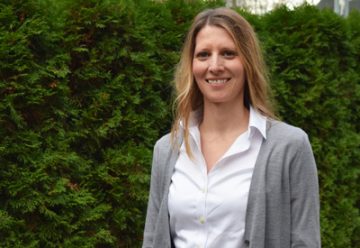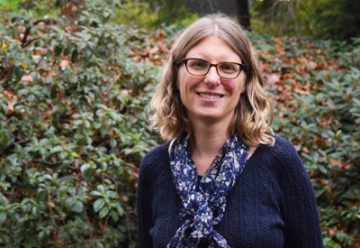As a kinesiology major and competitive athlete growing-up, pursuing physical therapy as a career was a natural fit for Maria Juricic who – after 13 years of working in the field – recently became the 100th graduate from UBC’s Online Master of Rehabilitation Science (MRSc) program.

Maria Juricic marks the 100th student graduating from UBC’s Online MRSc program.
Although Juricic remains humble when asked about her latest accomplishment and title as 100th graduate, she’s quick to acknowledge how the online Faculty of Medicine program helped her during an important time in her professional journey.
“I found myself working with a new population 10 years into my working career after I transitioned from pediatric oncology to a role with the Orthopaedics Cerebral Palsy Clinic at BC Children’s Hospital,” she said. “The program gave me an opportunity to really – in a concentrated way – learn about this new area of practice and apply what I learned right away.”
Juricic, also a Clinical Assistant Professor with the Department of Physical Therapy at UBC, says the program really offers the freedom you need as a working professional.
“You can transport school to wherever you are going and still do your studies,” she said. “That’s pretty amazing and so important when you are already a clinician.”
The MRSc program, spearheaded by Sue Stanton, the former Director of the UBC Rehabilitation Science Online Programs (RSOP), is a flexible way for working health professionals to expand their training and education. Since its beginning, the program has grown to become one of the largest online programs offered on UBC’s campus and one of only two fully online grad programs in rehabilitation sciences offered in Canada.
Learners are given the opportunity to develop and deliver educational and clinical programs for patients, learn effective ways of evaluating patient progress and program outcomes, as well as tailor specific course assignments to meet their clinical needs.

Patricia Mortenson, Program Manager of the Rehabilitation Science Online Programs.
The opportunity to cross geographic boundaries and borders connects learners from across Canada and around the world. In 2013-2015, enrollment into the MRSc program doubled and has remained steady ever since.
According to Patricia Mortenson, Program Manager of the Faculty’s RSOP, hitting the 100th graduate is an amazing milestone for the program, which is seeing a spike in interest from other health professionals.
“It’s become more multidisciplinary beyond occupational and physiotherapy,” she said. “In many of our courses we’ve had dieticians, social workers, recreation therapists, massage therapists and chiropractors. It’s grown to be more interprofessional and I think it’s really expanded everyone’s vision of what rehabilitation practice is and who is providing it.”
Mortenson believes there is even more potential for interprofessional participation in the coming years and says the collaboration with allied health professionals helps set a higher standard in patient care.
“Learners gain a lot from each other,” she said. “People who have been through programs like this speak a more common language, become better grounded in evidence and respect each other a lot more. We may be coming from different points of view but we can pull the same research article and have a common lens on it – this makes a difference in clinical care.”